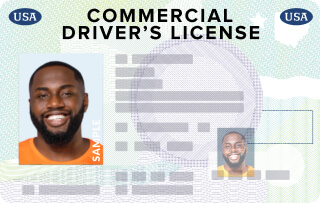- Updated for March 2025
- Based on 2025 TX commercial driver's license manual
Free TX CDL Tanker Vehicles Practice Test 2025
Texas is known for scorching hot weather, which often causes droughts and water shortages. During this time, tankers transport potable water for municipal use and agricultural irrigation across the Lone Star State. Because these vehicles have a higher center of gravity, they are often more difficult to control when compared to standard trucks. Liquid surge doesn’t make the drive easier, either. This phenomenon can occur during acceleration, leading to changes in the liquid’s momentum and creating strong forces that affect the stability of a tanker. An experienced tanker driver will know how to slightly mitigate this effect, but this skill can only be developed with hands-on practice.
Before you can get behind the wheel of an actual tanker, you must obtain a Tank Vehicles (N) endorsement on your Commercial Driver’s License (CDL). The Department of Motor Vehicles (DMV) requires all Texas residents to pass a written Tank Vehicles knowledge test before they are trusted with driving vehicles designed to transport liquids or gases in individual tanks of more than 119 gallons and a combined capacity of 1,000 gallons or more.
We’ll help you pass this exam and fulfill your dream of becoming a tanker driver, but you must know that there are no shortcuts you can take. The learning phase marks the beginning of a difficult but rewarding career, so it is crucial to pay attention to the concepts explained in the official 2025 CDL manual (Texas CDL Handbook 2025). After you’ve read the CDL manual’s discussion of tankers a few times, give our intuitive tool a try. It’s always better to be safe than sorry, so we created an environment closely reflecting the one you’ll encounter at the DMV location.
As you train with our Texas CDL Tanker Vehicles Endorsement practice tests, you’ll notice how your score naturally improves with time. It is perfectly normal to fail on your first few attempts, so we recommend disregarding your score while you are still studying for this endorsement. All 20 questions have multiple answer options, but only one is correct. Because your choice gets registered as soon as you click on it, avoid making unfortunate mistakes and only select an answer when you’re confident in your choice.
- Perfect for first-time and renewal CDL/CLP applicants, and those adding endorsements
- Triple-checked for accuracy
What you need to know

What to expect on the actual TX DMV exam
questions
correct answers to pass
passing score
List of questions (classic view)
- Side-to-side surge can cause
- How does liquid surge affect the handling of a tanker?
- Hauling liquids in tankers requires special care for which of the following reasons?
- How would you expect a truck with a cargo tank that has baffles to handle on the road?
- A smooth bore tank is also known as
- Empty trucks
- A tank endorsement is required for certain vehicles that transport
- The best way to take a curve in a tanker is to slow to a safe speed before entering the curve and then _________ as you go through it.
- The liquid in a tank with baffles can still have what kind of surge?
- You should be very cautious when driving smooth bore tankers, especially when you are
- You should know the outage needed for the liquids you carry because
- When you load the small tanks of a cargo tank equipped with bulkheads, you should check the
- A baffled tanker is one with
- You are driving on a clear night. You must dim your headlights from high to low. You should adjust your speed so you can stop within
- When your cargo tank has baffles, what handling effect do you expect?
- The movement of the liquid in partially filled tanks is called
- When should the driver of a tanker that has lost its brakes use a truck escape ramp?
- You are driving a tanker truck. The front wheels begin to skid. Which of these is most likely to occur?
- An emergency forces you to stop your tanker quickly or crash. You should
- Which of these statements about tankers are true?
- Alabama: Test 1 / Test 2
- Alaska: Test 1 / Test 2
- Arizona: Test 1 / Test 2
- Arkansas: Test 1 / Test 2
- California: Test 1 / Test 2
- Colorado: Test 1 / Test 2
- Connecticut: Test 1 / Test 2
- Delaware: Test 1 / Test 2
- District of Columbia: Test 1 / Test 2
- Florida: Test 1 / Test 2
- Georgia: Test 1 / Test 2
- Hawaii: Test 1 / Test 2
- Idaho: Test 1 / Test 2
- Illinois: Test 1 / Test 2
- Indiana: Test 1 / Test 2
- Iowa: Test 1 / Test 2
- Kansas: Test 1 / Test 2
- Kentucky: Test 1 / Test 2
- Louisiana: Test 1 / Test 2
- Maine: Test 1 / Test 2
- Maryland: Test 1 / Test 2
- Massachusetts: Test 1 / Test 2
- Michigan: Test 1 / Test 2
- Minnesota: Test 1 / Test 2
- Mississippi: Test 1 / Test 2
- Missouri: Test 1 / Test 2
- Montana: Test 1 / Test 2
- Nebraska: Test 1 / Test 2
- Nevada: Test 1 / Test 2
- New Hampshire: Test 1 / Test 2
- New Jersey: Test 1 / Test 2
- New Mexico: Test 1 / Test 2
- New York: Test 1 / Test 2
- North Carolina: Test 1 / Test 2
- North Dakota: Test 1 / Test 2
- Ohio: Test 1 / Test 2
- Oklahoma: Test 1 / Test 2
- Oregon: Test 1 / Test 2
- Pennsylvania: Test 1 / Test 2
- Rhode Island: Test 1 / Test 2
- South Carolina: Test 1 / Test 2
- South Dakota: Test 1 / Test 2
- Tennessee: Test 1 / Test 2
- Texas: Test 1 / Test 2
- Utah: Test 1 / Test 2
- Vermont: Test 1 / Test 2
- Virginia: Test 1 / Test 2
- Washington: Test 1 / Test 2
- West Virginia: Test 1 / Test 2
- Wisconsin: Test 1 / Test 2
- Wyoming: Test 1 / Test 2
Your go-to, trusted source
Experience the Driving-Tests differenceOur commitment to accuracy and quality in our practice tests
Explore our rigorous, multi-tiered verification process that ensures each question mirrors the official manual for unparalleled accuracy.

At Driving-Tests.org, we understand the importance of reliable and accurate practice tests to help you prepare for your DMV exam. That's why we've developed a meticulous process to create and continually update our practice questions, ensuring they reflect the most current driving laws and regulations.
Here's an inside look at how we maintain the highest quality in our practice tests.
Content Creation and Verification Process
- Alignment with Official Manuals:
Every question we develop is based on the most recent version of each state's official driving manual. Our team regularly monitors each state DMV's website for the latest updates to ensure our practice tests are always aligned with the most current information. - Community Feedback Integration:
We leverage feedback from our vast community of users to understand which topics are most frequently tested. This helps us focus on the areas that are most relevant and beneficial for your preparation. - Expert Content Creation:
Our in-house editor, Steven, who has extensive experience in driver education, crafts each question with precision. He conducts a thorough review of each question against the official manuals to ensure accuracy. - Rigorous Review Process:
Once Steven has finalized a set of questions, our team conducts a joint review session. This second level of scrutiny involves content accuracy, proofreading, and fact-checking to eliminate any errors. - User Feedback Mechanism:
After a question goes live on our site, we keep the lines of communication open. Each question features a feedback button, inviting users to report any issues or errors. This continuous feedback loop allows us to address and rectify any concerns promptly. - Responsive Updates:
In line with our commitment to accuracy, we quickly update our practice questions to reflect any changes in the DMV manuals. Additionally, we update the free electronic copy of the state's driver's license manuals on our site, typically within a few days after the DMV publishes them.
Our thorough quality control process ensures that you have access to practice tests that are as accurate and up-to-date as possible. We believe in the power of well-prepared drivers and are dedicated to providing you with the best study tools to help you succeed on your DMV exam.
Before you view your test results, discover how you can pass faster with Premium:
- Real Exam-Like Texas QuestionsGet all exam-like questions seen on the real test
- Money-Back GuaranteeIf you don't pass, it costs you nothing
- 99.06% Pass Rate vs. 49% AverageMost Premium users pass on their first try





Trusted by 1.15 Million drivers
